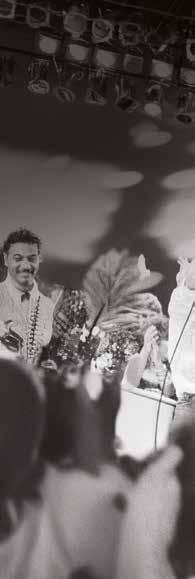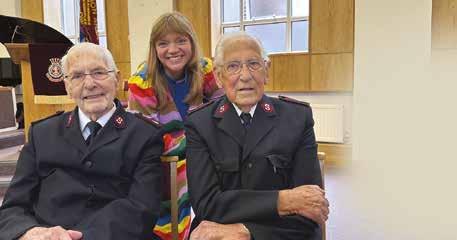Musical arrangements

Remembering Live Aid rocking all over the world


Remembering Live Aid rocking all over the world
The Salvation Army is a Christian church and registered charity seeking to share the good news of Jesus and nurture committed followers of him. We also serve people without discrimination, care for creation and seek justice and reconciliation. We offer practical support and services in more than 700 centres throughout the UK. Go to salvationarmy.org.uk/find-a-church to find your nearest centre.
The Salvation Army first published a newspaper called the War Cry in London in December 1879, and we have continued to appear every week since then. Our name refers to our battle for people’s hearts and souls as we promote the positive impact of the Christian faith and The Salvation Army’s fight for greater social justice.
Editor: Andrew Stone, Major
Deputy Editor: Philip Halcrow
Staff Writer: Emily Bright
Staff Writer: Claire Brine
Staff Writer: Ewan Hall
Editorial Assistant: Linda McTurk
Graphic Designer: Mark Knight
Graphic Designer: Natalie Adkins
Email: warcry@salvationarmy.org.uk
The Salvation Army United Kingdom and Ireland Territory
1 Champion Park London SE5 8FJ
Tel: 0845 634 0101
Subscriptions: 01933 445445 (option 1, option 1) or email: subscriptions@satcol.org
Founders: Catherine and William Booth
International leaders: General Lyndon Buckingham and Commissioner Bronwyn Buckingham Territorial leaders: Commissioners Jenine and Paul Main
Editor-in-Chief: Major Julian Watchorn
Printed by CKN Print, Northampton, on sustainably sourced paper
Where words fail, it is said, music speaks. The saying is a reminder of the power that music has to convey and stir emotions.
As we note in this week’s War Cry, 40 years ago close to two billion people were stirred by the Live Aid concert that was staged in London and Philadelphia and broadcast across the world. Many of those watching and listening were subsequently inspired to donate money to help people suffering from drought and famine. It was the biggest music extravaganza of its time, and this week many of the fans who saw and heard it will be remembering the event.
Music also features elsewhere in this issue, as we interview Radio 3 controller Sam Jackson, who is overseeing the forthcoming Proms season.
‘You feel an acute sense of responsibility,’ he tells us, before explaining that every year the Proms has to be ‘artistically excellent and offer something different’.
Sam also believes that music can help people connect with something deep.
‘If you look at something like Choral Evensong on Radio 3,’ he says, ‘it’s enjoyed by a really big audience of people – some of whom would not necessarily call themselves Christians. They listen because of the beauty of the music. There is something transcendent about that incredible repertoire.’
For those listening to Choral Evensong who are Christians, the music played and the words sung give them an opportunity to connect with God and to experience his presence in their lives.
Music has been helping people to deepen their faith and belief for millennia. The Bible contains many references to times when people used instruments and their voices to speak of their belief in a God who loves and cares for us all.





Feature by Claire Brine
Aharrowing news report about human suffering. A charity single, released just in time for Christmas. A summertime, dual-venue concert, broadcast around the globe. Forty years ago, Live Aid brought the world together to fight famine in Africa.
On Saturday 13 July 1985, some of the world’s biggest music stars took to the stage to raise millions of pounds for famine relief in Ethiopia. At Wembley Stadium, fans paid £25 a ticket to see the likes of David Bowie, U2, Queen and

Elton John belting out timeless classics including ‘We Are the Champions’ and ‘Rocket Man’.
On the other side of the Pond, stars such as Madonna, Bryan Adams, Mick Jagger and Tina Turner rocked the stage in front of the thousands at John F Kennedy Stadium in Philadelphia.
Broadcast in more than 100 countries around the world, the 16 hours of Live Aid music were watched by close to two billion people.
This week, there is the opportunity to relive the concert that put global aid in the spotlight. On Sunday (13 July), Greatest Hits Radio will replay the entire concert as it happened. There’s also the opportunity for the public to learn about the story behind the concert through the TV documentary Live Aid at 40, available on BBC iPlayer.
The three-part series explains how it all started with a 1984 BBC news broadcast, in which reporter Michael Buerk saw firsthand the effects of the Ethiopian famine, describing it as ‘the closest thing to Hell on Earth’.
Back in the UK, musician Bob Geldof couldn’t get the news pictures out of his mind. He wanted to do something to help. So he and his pal, Midge Ure, came up with the idea of writing a charity single.
Enlisting the help of some famous friends, including U2 and Bananarama, they recorded the song ‘Do They Know
It’s Christmas?’. The track went straight to No 1 – and the money raised went straight towards alleviating suffering in Ethiopia.
The next year, Bob came up with a follow-up fundraising idea: to stage a massive concert in both the UK and the US and to broadcast the performances live across the world. The feat was described by one news reporter as ‘the most ambitious pop project ever attempted’.
‘It seemed a harebrained scheme,’ says Queen guitarist Brian May, in Live Aid at 40. ‘It seemed like this could never happen.’
But it did happen. And when the acts played, the donations poured in. The world became united in its fight against famine and poverty. The world showed that it cared.
Forty years later it still needs to care –and find new ways of showing it. It’s not fair that thousands of people continue to live in conditions akin to ‘Hell on Earth’. It’s not how life was ever intended to be.
In a world in which people suffer, God longs for justice – and he urges us to play a part in creating it. The Bible says: ‘The Lord has told us what is good... To do what is just, to show constant love, and to live in humble fellowship with our God’ (Micah 6:8 Good News Bible).
The message couldn’t be clearer. Where we can help others, we should. We must. And when we do, life becomes all the richer – for everyone.
Emily Bright gives her take on a story that has caught the attention of War Cry reporters
It’s the mane rugby event of the year. Top talent from England, Ireland, Scotland and Wales comprise the Lions squad in its quadrennial tour of the southern hemisphere.
This year, the Lions play Australia, hoping to replicate a 2-1 series win against the Wallabies in 2013. Led by captain Maro Itoje, the team will face its first international test in Brisbane next Saturday (19 July).
Having secured the captaincy for England in January, it has been a big year for the 30-year-old. But Maro has kept grounded thanks to his Christian faith.
He told BBC Sport that his relationship with God has become increasingly important to him, and that he now tries to read his Bible or pray daily – a discipline that he is planning to sustain throughout the tournament.
Everything that is good is a gift from God
‘In the last two or three years, I have made a conscious decision to double down in that regard,’ Maro said. ‘I was probably a lukewarm Christian for a large part of my life. I was probably someone who went to church, but was not really living the principles or values of it that deeply, but I have always been a believer.
‘The humility that I have tried to embody throughout my life definitely comes from knowing that everything I have has been a gift, not by my own doing, but by the guy upstairs.’
I love how Maro talks openly about his relationship with God. He offers a useful reminder that reading Scripture and praying can connect us with God and equip us with the principles and values required for everyday life.
But what I’m most challenged by is his idea that everything that is good is a gift from God. Sometimes I’m so busy focusing on whatever I think I need next that I miss what God has already blessed me with.
I can’t help wondering whether, if we approached life with a little more gratitude and humility, celebrating it as a gift, we’d be able to tackle it with much more positivity and hope.
Let’s give thankfulness a try.






Priest says perk is being present
In its Money blog, Sky News interviewed the Rev Helen Harknett about her life as the priest-incharge at St Philip and St Mark’s in Camberwell, London.
Helen explained that, instead of a salary, priests are paid a stipend, which is ‘paid to enable the clergy person to exercise their ministry without the need to take another job to earn their living’.
She added that, while the ‘rewards are never going to be financial in this role’, the biggest perk is being present during ‘the most significant moments’ of people’s lives, such as births, marriages and deaths.
‘We tend to see people both at their happiest and at their most vulnerable, and that is always a great privilege,’ she explained.
During the interview, Helen also touched on the skills required of priests. She emphasised that the most important skill to learn ‘is to rely on and trust God’ and ‘not on your own talent, strength, tenacity’.
James B Partridge leads festivalgoers in some ‘primary school bangers’


More than 20 faith leaders have urged the government to raise public funds by taxing fossil fuel companies and the ultra-wealthy.
In a letter addressed to chancellor Rachel Reeves and foreign secretary David Lammy, the signatories – including Christians, Jews and Muslims –argued that taxing big polluters could lower UK energy costs and support a shift to clean energy.
‘In many faith systems, paying taxes is part of the functioning of a just society,’ they said, adding that polls have shown that ‘taxation as a means of contributing to the common good and caring for the natural world’ is supported by the general population.


Kate with George and Maurice and (inset) with Commissioner Jenine Main
Songs of Praise is celebrating 160 years of The Salvation Army in a special episode on Sunday (13 July).
In the programme – scheduled for broadcast at 12.15pm on BBC1 – the Rev Kate Bottley meets the church and charity’s UK and Ireland co-leader, Commissioner Jenine Main, to learn about its history and how the vision of founders Catherine and William Booth lives on today.
Also in the episode, Captain Nick Ward, co-leader of the Salvation Army church in Mitcham, south London, invites Kate on board a double-decker bus which acts as a wellbeing hub. The project offers free food to people experiencing homelessness, support with employment and mental health, and play areas for children.
Lastly, Kate speaks to best friends George and Maurice, who met through a Salvation Army band more than eight decades ago. They recall their musical experiences including memorable performances at the Hollywood Bowl and Buckingham Palace.

3 controller
reveals what audiences can expect from this year’s BBC Proms and why the festival is an inclusive celebration of classical music
Interview by Emily Bright
Scroll through the BBC Proms programme online and you’ll find a delightfully diverse line-up. The classical music festival showcases well-known composers and conductors, relatively undiscovered artists and plenty of talent in between. Different genres and styles take centre stage in the annual celebration, which starts on Friday (18 July).
‘For a long time, inclusivity has run through the Proms like a stick of rock,’ says Sam Jackson, controller of Radio 3 and the BBC Proms. ‘Henry Wood, its founder, wanted to bring the best music to the broadest possible audience. In his day, he programmed Victorian parlour songs because people loved them. It wasn’t only about playing symphonies and concertos. There was a whole mix of repertoire.’
In his role, Sam seeks to juggle creativity and a desire to reach new audiences with a reverence for the classical heritage of the Proms, a festival which dates back to 1895.
‘You feel an acute sense of responsibility,’ he explains. ‘There’s an element of the Ming vase: I need to protect it, carry it and make sure I don’t drop it. At the same time, I know that I’m not just paid to keep things ticking over. I need to bring fresh ideas.’
To illustrate the value of thinking creatively, Sam offers two highlights from recent years: a global pop star’s performance and music channelling a children’s TV series.
Sam Jackson
‘In 2024, the Proms was Sam Smith’s only performance in the UK that year, as well as their first performance with an orchestra,’ he says. ‘It was a completely

new arrangement, so fans of Sam Smith heard their music in an exciting way. And people who love the Proms were able to experience something a little bit different too.
‘Also, a couple of years ago, we had ’Orrible Opera from CBBC’s Horrible Histories, with actors playing the role of composers. My son still talks about that now. We’re introducing the joy of this music to a new generation.’
Sam adds that everything at the Proms has to be ‘artistically excellent and offer something different’, something which he hopes to replicate this year.
‘There are some artists that we're bringing to the Proms who have never performed at the festival before,’ he says.
One such debutante is Grammywinning US jazz artist Samara Joy, who will be offering twists on instrumental jazz classics, accompanied by the BBC Concert Orchestra.
There are many other genres on show too. On 26 July, Claudia Winkleman hosts a musical exploration of TV reality show The Traitors, billed by the BBC as ‘a spine-tingling celebration of musical treachery … with its tense and haunting sound world’.
And, in the same vein as previous years, there’s something for younger audiences: on 25 August CBeebies Prom: A Magical Bedtime Story features
a musical tale from friends of the TV channel and orchestral accompaniment from Sinfonia Smith Square.
These performances all take place at the Royal Albert Hall in London. But there’s plenty on offer outside the capital city too, as the festival expands its geographical reach.
‘The Royal Albert Hall is the engine room of the Proms,’ says Sam. ‘It’s such an important part of the festival, and the biggest venue by a country mile for anything that we do.
We’re
‘But we’re increasingly wanting to ensure that if people live in other parts of the UK and can’t afford to get to London, or don’t want to, we bring something of that Prom spirit to them.
‘Last year we were in Nottingham, Gateshead, Bristol, Newport and Aberdeen and various other places. This year we’ll be in some of those places again, but we’re also going to new ones and reaching different audiences.’
For instance, in July, singer-songwriter Jade makes her first appearance at the Proms, collaborating with the Royal Northern Sinfonia in Gateshead. In August – to celebrate the centenary
of Radio 4’s Shipping Forecast – poet laureate Simon Armitage will be in Belfast to perform a new work, inspired by the ocean and elements, alongside his musical group LYR and the Ulster Orchestra. And in September, Beninese singer Angélique Kidjo will perform a tribute to her African heritage alongside the BBC Philharmonic Orchestra in Bradford, this year’s UK City of Culture.
Sam’s hunger for diverse talent may stem from his own ‘really broad musical taste’. He believes that audiences can hear the ‘profound in Radiohead, a symphony, a hymn or the St John Passion by Bach’. With that in mind, he is keen to offer music that everyone can enjoy on a deep, perhaps even spiritual level, regardless of beliefs or backgrounds.
‘If you look at something like Choral Evensong on Radio 3, that’s enjoyed by a really big audience of people – some of whom would not necessarily call themselves Christians,’ he says. ‘They listen because of the beauty of the music. There is something transcendent about that incredible repertoire.
‘When you hear that melody or you sing that hymn, it can take you back to a certain time, and you feel a sense of



From page 7
comfort. There’s something powerful in that.’
Over the years, Sam has found a powerful comfort not just in music, but in his Christian faith.
‘I didn’t grow up in a Christian family,’ he recalls. ‘I made a personal decision when I was 18 to become a Christian through a series of quite profound experiences.’
Faith is meant to be all-encompassing
His interest in faith was sparked during the summer before he went off to university. He watched a TV documentary presented by David Frost about a course called Alpha, which enables people to investigate the claims of the Christian faith. Weeks later, through a series of circumstances, he decided to try it out for himself.
‘In my first term at university, I was clearing up in the kitchen,’ he recalls. ‘It was an absolute pigsty, with pots and pans everywhere. Something in me went: “Oh, I should just clear all of this up and get this kitchen completely cleaned.” That wasn’t really normal in itself, but that’s what I ended up doing. And at that moment, some people walked in.
‘We had a chat and they said: “We’re just putting up a poster for this course we’re doing about Christianity.” And I said: “Is that Alpha? I saw a documentary about that over the summer. I’ll come along.”
‘They left and about 10 seconds afterwards, somebody from my corridor came in, tore the poster down and put it in the bin. I look back on that moment and think that if I hadn’t done the washing-up, I never would have seen the poster about that Alpha course on the pinboard.’
Since university, Sam’s faith has played a defining role in his life. As he approaches another busy festival season, it helps him keep his work in perspective.
He explains that, while he sees his job as a blessing, he tries to remember that his ‘worth is not dictated’ by it.
‘If everything else fell away – if work tomorrow didn’t exist,’ he says, ‘would it fundamentally change who I am as a person? I don’t think it would. But faith is meant to be all-encompassing. It’s about who you are.’

director
Interview by Ewan Hall

people discuss their

In an age when social media and news reports suggest that there’s much that divides people, it’s easy to forget the value of simply talking with and listening to someone who has a different political, cultural or religious viewpoint. Such conversations can build bridges.
Someone who knows the importance of those conversations is Jill Appleton, national director of the Feast, a charity that aims to create opportunities for children and young people to engage in positive discussions about their own faith and to learn about others’ beliefs.
‘The Feast was started by Canon Dr Andrew Smith, who is currently the director of interfaith relations for the Bishop of Birmingham,’ says Jill. ‘In the 1990s he worked for Scripture Union
and would go into schools and deliver Christian assemblies. Andrew found that after an assembly some young Muslim lads would want to argue with him about what he’d said about Jesus.’
Andrew spent some time thinking of how to have good conversations about beliefs and felt prompted to invite Muslim students to tell him what they loved most about their own faith.
From this initial idea, Andrew developed the concept of encouraging students of different faiths to speak to each other, and in 2008 formed the Feast, the charity gaining its name after
Turn to page 10 f
From page 9

Andrew invited some friends to a dinner to discuss his idea. Since then, the Feast’s work has expanded across the UK and the world.
‘Our bread-and-butter work is to bring young people of different faiths and backgrounds together,’ Jill says.
The Feast carries out this work by running events, in and out of schools, in which young people engage in activities, including discussion starters, workshops and games – all aimed at facilitating honest and respectful dialogue about beliefs and challenging issues.
Jill says that there have been many times when she has seen how the charity’s work carries on affecting people’s lives long after the events it holds. One example that stands out for her occurred two years ago, when she was looking to buy a new car at a large car supermarket.
‘The car I was driving at the time had a Feast sign on it, and the salesman who
was helping me looked at it and said: “I know what the Feast is.” He called his boss over, and said: “This lady works for the organisation that saved my life. If it wasn’t for the Feast, I’d either be dead or in prison now.”’
In that moment he didn’t want to be a part of gang culture
Jill discovered that the salesman had grown up in a suburb of Birmingham at a time when there was a great deal of tension between his Black community and the Asian community. The young man had even been drawn into a gang. But his mum had persuaded him to go on an activities weekend organised by the Feast.
‘He’d had a great weekend,’ Jill
recounts, ‘and on the Sunday morning found himself at breakfast sitting next to a lad and having, in his words, a great laugh. Then it occurred to him that the lad was a Muslim and was probably the most genuine person he’d hung out with for a long time. So he realised that the narrative of mistrust that he had bought into was a lie.
‘He decided in that moment he didn’t want to be a part of gang culture any more. He went home and started going to church again.’
To make sure every conversation is a positive one for the young people, the Feast has produced guidelines for dialogue. Participants are encouraged to listen with respect and, instead of arguing for their own faith, let the other person explain theirs.
Despite the guidelines and the charity’s best efforts, Jill says that the Feast’s work is not always plain sailing.
‘Some parents are afraid that if they



send their child to something where they’re going to be mixing with young people of different faiths, they might want to change their faith,’ she explains.
At times in the past, leaders from churches and mosques had also been reluctant to let children attend Feast events. However, today the charity faces less opposition, because people have seen the positive difference its activities have made.
‘Communities are seeing that their young people are becoming more confident and more interested in their own faith,’ Jill says. ‘We’ve never had a young person convert to a different faith. And I think that’s because the heart of what we do is to talk positively about our own faith, not negatively about others’.
‘We’re not saying to young people, you’ve got to make somebody change their mind. We’re saying, find out what this person believes, get to know them and become friends with them.’
Jill has been able to bring 30 years of
teaching experience to her role with the Feast, and she has found that working in this different way with children and young people has dramatically influenced her own relationship with God.
I can truly be myself, and that has been life-changing
‘Like a lot of teachers, I thought I couldn’t do anything else but teach,’ she says. ‘But I took early retirement and then started working part-time at the Feast. I hadn’t heard about the charity before then, but when a friend directed me to it and I saw what it was doing, it just made sense.’
Jill describes working at the Feast as ‘coming home’ and she is grateful for the way her responsibilities have made her more comfortable in sharing her faith with
other people.
‘I’ve never been so confident in my faith and talking about it as I have been since I’ve been at the Feast,’ she enthuses. ‘Because I’ve found myself in a space where I’m with young people of all different faiths and none, I’ve found that I can truly be myself, and that has been life-changing.’
Jill describes the deep friendships that have formed among staff and volunteers from various religious backgrounds who respect and care for each other.
‘We’re not about changing people’s minds or making people agree with us,’ Jill says. ‘We’re about understanding ourselves and each other better. That approach is so wholesome. And it leads to a confidence in faith that young people – especially young Christians – would not otherwise have.
‘And if I raise a curiosity in a young person to find out about their faith, I believe that Jesus is there alongside me saying: “This is great.”’
The War Cry invites readers to send in requests for prayer, including the first names of individuals and details of their circumstances, for publication. Send your Prayerlink requests to warcry@salvationarmy.org.uk or to War Cry, 1 Champion Park, London SE5 8FJ. Mark your correspondence ‘Confidential’.
There is no set formula to becoming a Christian, but many people have found saying this prayer to be a helpful first step to a relationship with God
Nigel Bovey gives chapter and verse on each book of the Scriptures
As the book that bears his name testifies, the prophet Jeremiah had an unenviable God-given duty. He had to warn the nation of Judah about its impending doom and to explain that it was facing God’s punishment because of its spiritual unfaithfulness.
The phrase ‘the word of the Lord’ dominates the Book of Jeremiah. By contrast, according to tradition, the Book of Lamentations is Jeremiah’s own personal response to the fall of Jerusalem.
Before it fell in 587BC, the city had been under siege for the better part of two years. In this book – in five separate laments – Jeremiah graphically recounts the realities.
In the first, the once-bustling Jerusalem lies wasted, deserted, despised and desolate. Looted of its treasures, its citizens trade their dwindling possessions for food. The city is abandoned by allies and by God – all because of Judah’s stubborn sinfulness.
Lord Jesus Christ,
I know that I have done things in my life that are wrong and I’m sorry. Thank you that I can ask you for forgiveness because of the sacrifice you made when you died on the cross.
Please forgive me and help me to live a better life in the future as I learn how to love you and follow your way of living.
Thank you, Lord Jesus.

If you’ve prayed this prayer, scan the QR code or contact us using the coupon on this page

In the second lament, God is said to be ‘like an enemy’ (2:5 New International Version). He has destroyed the nation, levelling her fortifications and abandoning the Temple. The onlooking world rejoices, while God is seemingly untouched by the grief and suffering of his people.
The third lament is Jeremiah’s description of the personal effect that being God’s spokesman had on him. Mentally traumatised and physically emaciated, he is the butt of public rebuke. Consequently, he is bitter, restless and cynical. But he is not totally disillusioned.
He writes: ‘Yet this I call to mind and therefore I have hope: Because of the Lord’s great love we are not consumed, for his compassions never fail’ (3:21 and 22). It is a glimmer of light in the depths of his darkness. Restoration is possible.

Jeremiah’s fourth lament contrasts Jerusalem’s present desolation with its earlier glory. Men are a shadow of their former selves. Children beg for food. The once wealthy are now destitute. Mothers are desperate, cooking their own children for food.
In the fifth and final lament, Jerusalem is populated by widows and orphans. Leaders are tortured. Boys are put to hard labour. Women and girls are raped. Jeremiah prays for God’s mercy and restoration.

To receive basic reading about Christianity and information about The Salvation Army, complete this coupon and send it to



Feature by Ewan Hall
Prepare for tee-off, as the Open swings into action on Thursday (17 July). Golfers from around the world will be trying to drive, chip and putt their way across the Dunluce Links course at Royal Portrush in a bid to win the Claret Jug.
Hugh Bonneville recently starred in which BBC1 crime drama based on a real-life heist?
The Thar Desert spans which two countries? 1 2 3 4 5 6
Which Disney film remake tells the story of a lonely Hawaiian girl and her blue alien pet?
How many minutes are in a full week?
Who wrote the novel Robinson Crusoe?
Which car manufacturer produces the Golf?
The Open’s return to Northen Ireland is likely to bring the competition its largest crowd outside of St Andrews, with 278,000 fans expected. And over the four days of the championship, those spectators may well see times when the coastal course’s unpredictable Atlantic winds challenge even the best players, or moments when the deep gulley on the 16th – the hole nicknamed Calamity Corner – punishes any shot that falls short.
Many fans will also be keeping an eye out for local hero Rory McIlroy, who earlier this year became the first European player to win all four of golf’s majors.
Since completing that grand slam, however, his form has dipped.
‘I climbed my Everest in April,’ Rory told the media at the US Open. ‘And I think after you do something like that, you’ve got to make your way back down, and you’ve got to look for another mountain to climb. An Open at Portrush is certainly one of those.’
Though our Everest may not be completing a golf grand slam, perhaps we can relate to the joy of achieving a goal – whether it be finding a job, writing off debts or finding the courage to pursue a new relationship. But we may also know the feeling that, once the task has been fulfilled, we are at a crossroads and are wondering what to do next.
While some people choose their next challenge alone, others rely on God to help determine their next steps.
In one Bible passage God tells people who may have been worried about what lay ahead: ‘I know the plans I have for you … plans to prosper you and not to harm you, plans to give you hope and a future’ (Jeremiah 29:11 New International Version).
We all face challenges that test us, but if we trust in God, he will help us get the best possible result.

ACROSS
1. Tarry (4)
3. Front of boat (3)
5. Resolute (4)
7. Tired out (9)
9. Rave (4)
10. Plunge (4)
11. Footwear (5)
14. Exploded (5)
15. Fruit (5)
17. Up to (5)
18. Imagine (5)
19. Jumped (5)
20. Trivial (5)
23. Ache (4)
25. Inheritor (4)
27. Made up (9)
28. Not one (4)
29. Auction item (3)
30. Pull (4)
1. River dam (4)
2. SMS (4)
3. Seashore (5)
4. Squander (5)
5. Bolted (4)
6. Female horse (4)

7. Vigorous (9)
8. Paraded (9)


Each solution starts on the coloured cell and reads clockwise round the number
11. Baffle (5) 12. Group of eight (5) 13. _____ Phillips, actress (5) 14. Not good (3) 16. Consume (3)
21. Perform well (5)
22. Silent (5)
23. Chess piece (4)
24. Memo (4)
25. Grasped (4)
26. Ladder step (4)



INGREDIENTS
METHOD
3tbsp fat-free, plain Greek yogurt
¼ tsp mild or medium curry powder
1tsp lemon juice
Pinch turmeric (optional)
1 dried apricot, finely diced
10cm cucumber, deseeded and diced
1tsp sultanas, diced 120g cooked chicken breast, cooled and shredded
4 medium slices wholemeal bread

INGREDIENTS
300g redskinned potatoes, scrubbed and halved
2tbsp low-fat natural yogurt
2tbsp low-fat crème fraiche
2tbsp chives, finely chopped
Freshly ground black pepper

To make the sandwich filling, combine the yogurt, curry powder, lemon juice and, if using, turmeric in a bowl. Add the apricot, cucumber, sultanas and chicken and mix thoroughly.



Assemble the sandwiches using the wholemeal bread slices and cut into quarters.

METHOD
Boil the potatoes in a pan of unsalted water until tender, then drain. Heat the potatoes in the pan over a medium heat to dry them, then cut into 1cm cubes and leave to cool.
Mix the yogurt, crème fraiche and most of the chives in a bowl, then toss with the potatoes. Season with pepper and garnish with the

